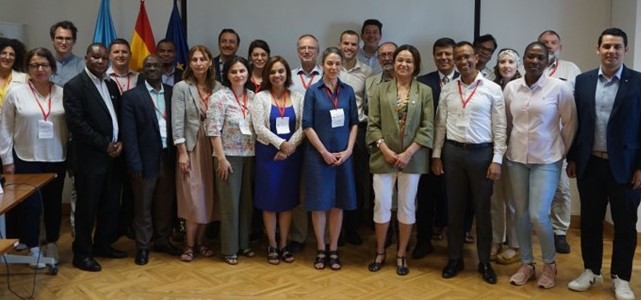To build on the work of the first Intergovernmental Working Group on Drought (IWGD) that carried out its work from 2020-2022, the United Nations Convention to Combat Desertification (UNCCD) passed Decision 23 at COP.15 that agreed to the creation of a second IWGD for the triennium 2022-2024. GWPEA attended the third Meeting of the second IWGD, which was organized in Spain Madrid between 21st to 23rd June. The meeting was convened and hosted by the Ministry for the Ecological Transition and the Demographic Challenge of the Government of Spain, to discuss the matrix of elements and evaluation criteria adjustments of the proposed drought policy options. The meeting also discussed the progress report to be submitted to the Parties for the 21st session of the Committee for the Review of the Implementation of the Convention (CRIC) which will be held in October 2023 in Samarkland, Uzbekistan.
GWPEA is one of the regional constituencies, of the Intergovernmental Working Group on Drought, representing the East Africa region. The Working group constitutes of other regions around the world, and it is tasked with developing effective policies and measures to address drought. The second IWGD was tasked with identifying and evaluating all options to effectively manage drought under the Convention, including supporting a shift from reactive to proactive drought management.
At the opening of the meeting, Ms. Andrea Meza, Deputy Executive Secretary of the UNCCD, expressed gratitude for the work that the working group had executed in the past two years, especially on developing the drought policy which would be presented to the COP16. “There is a need to shift from a reactive to proactive drought management. I am confident that this meeting will evaluate all options on global policy mechanisms and regional policy frameworks to be able to link them to national plans and thus manage drought under the convention”, she said.
The UNCCD secretariat presented an options paper and a draft CRIC report based on IWGD meeting discussions that was held in Yerevan, Armenia. The meeting used an agreed criteria to reduce the options from originally twenty-six (26) arising out of the Yerevan meeting to eight (8) in Madrid. The eight agreed upon options were categorised under Finance, Technical options, Legally binding options of the convention and Non-legally binding.
The process is still open to stakeholders to receive more input and comments for consideration. This arrangement will shape up the options better and make them relevant for discussions by the parties at the COP16 in Saudi Arabia in 2024. Meanwhile, as part of taking forward the inputs to the selected options, the team from European Union, Spain and Global Water Partnership agreed to spearhead the elaboration of the options under the non-legally binding category using the methodology and considering the criteria that was recommended by the second IWGD. This will involve amplification of the justification, elements, institutional arrangements and carrying out a detailed evaluation of the non-legally binding category options to be forward to the UNCCD secretariat.
